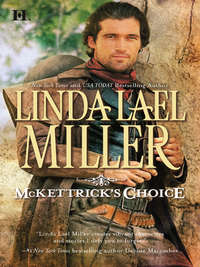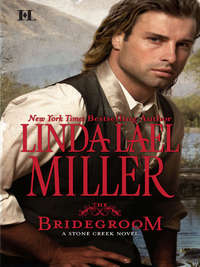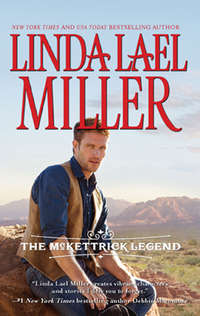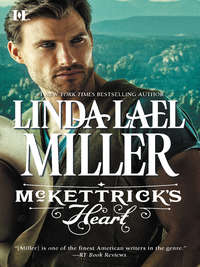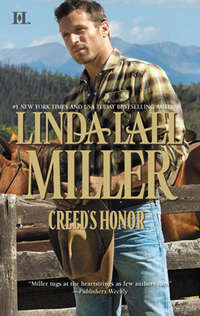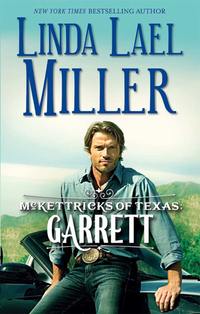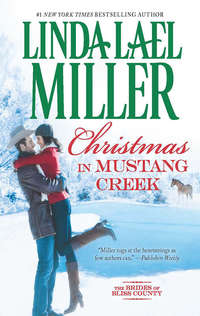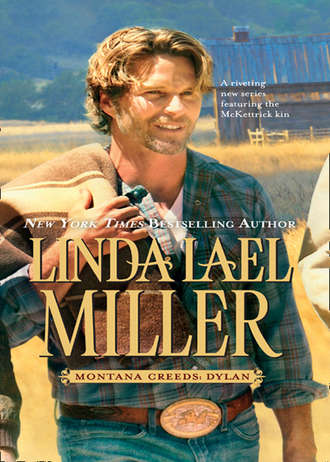
Полная версия
Montana Creeds: Dylan
She hung her purse on a peg, washed her hands at the sink in the little kitchenette between the meeting rooms and started wrestling with the big coffee urn.
Sheriff Floyd Book was the next to arrive—he carried in a box of books from his personal car and greeted Kristy with a smile and a nod. “I knew if I didn’t get here too quick, you’d make the coffee,” he teased.
Kristy laughed. “Everything in place for your retirement?” she asked, setting out columns of disposable cups, packets of sugar and powdered creamer and the like.
“Everything except me,” Floyd replied, through the open doorway leading to the AA side, already setting out books and pamphlets for that night’s meeting. In Stillwater Springs, nobody was anonymous, but for the sake of what was called The Program, everyone pretended not to notice who came and went from the side entrance to the library on a Tuesday night. “I can’t hardly wait for that special election. Hand my badge over to Jim Huntinghorse or Mike Danvers, and kick the dust of this town off my feet—for a few weeks, anyhow. Dorothy and I are all packed for that cruise to Alaska.”
“Soon,” Kristy soothed good-naturedly. She’d been too busy, until the mention of the woman’s name, to notice that Mrs. Book was nowhere around. “Dorothy isn’t coming to the reading group meeting? She signed up.”
Dorothy Book was confined to a wheelchair, following an automobile accident some years before, and there were people who said she wasn’t right in the head. Kristy had always liked Dorothy—so what if she was a little different?—and she’d been looking forward to having her come to the group’s first meeting.
Floyd shook his head. He’d looked weary lately, worn down to a nubbin, as Kristy’s late mother used to say. Maybe it was the buildup to his retirement, the stresses of his job, and the uncertainty of the special election, but it seemed to Kristy that he was more strained than usual.
“It’s hard for her to get in and out of the car,” the sheriff told Kristy. “And she hates fussing with that wheelchair. I’m hoping the cruise will put some color back in her cheeks and a twinkle in her eyes.”
Kristy stopped fiddling with the coffee things. Floyd Book was the sheriff of a sprawling county—he’d been elected to the office when she was in the second grade and had held it ever since. Until her dad died, just six months after her mother’s passing, Floyd had been a regular visitor out at Madison Ranch. He and Kristy’s father had been best friends, sharing a love of fishing, horseback riding and herding the few cattle Tim Madison had been able to afford to run on that hard-scrabble place.
A pang struck Kristy as she started to ask Floyd, straight out, if something was wrong and if so, what she could do to help. This was a night, it seemed, for painful memories to come up.
“You all right, Kristy?” Floyd asked, crossing the hallway to lay a brawny hand on her shoulder. “You went pale for a second there. I thought you were going to faint.”
“I’m fine,” Kristy lied. She’d been raised as a tough Montana ranch kid, expected to say she was fine whether she was or not.
But the ranch was abandoned now, the barn leaning to one side, the sturdy old house empty. The last time Kristy had forced herself to go out there and stand on the high rise where she used to ride Sugarfoot, her beloved palomino gelding, she’d actually felt her heart break into pieces.
Her parents were both dead, and she had no brothers or sisters, no aunts—now that Great-Aunt Millie had passed away—or uncles, no cousins.
Sugarfoot was gone, too, buried in a horse-size grave in the middle of a copse of trees bordering the Creed ranch. After sixteen years, more than half her life, Kristy still cried when she visited her best friend’s final resting place. People urged her to get another horse—she’d loved riding, and she’d been uncommonly good at it, too—but somehow, she just didn’t have the heart to love something—or someone—that much and risk another loss.
She’d lost so much already.
Her parents, Sugarfoot.
And Dylan Creed.
“Kristy?” the sheriff prompted, peering worriedly into her face now. “Maybe you ought to go home. You might be coming down with something. I could tell the reading-club ladies the meeting’s been postponed.”
Kristy summoned up a smile, straightened her shoulders, looked her father’s old friend straight in the eye. “Nonsense,” she said. “We’ve already postponed it once. I’m just a little tired, that’s all.”
Floyd didn’t seem entirely convinced, but a few of the AA regulars were straggling in, so he finally turned to go and greet them, the way he had every Tuesday night for years—ever since Dorothy’s car accident, and that scandal about him running around with Freida Turlow behind Dorothy’s back. He’d wept, sitting at the kitchen table with Kristy’s dad, out on the ranch, over the pain Dorothy had suffered, not only because of the wreck on an icy road, but because he’d betrayed her with another woman.
It was the first and only time Kristy, watching and listening unnoticed from the hallway, had ever seen a grown man cry.
Her kindly dad had put a hand to Floyd’s shoulder and said, “It’s the drinking, old buddy. That’s what’s messing up your life. You think I don’t know you carry a flask everywhere you go? You’ve got to do something.”
And Floyd had done something. He’d joined AA, gotten sober and, as far as Kristy knew, been a faithful husband to Dorothy from then on.
Kristy left the kitchenette for the reading group’s meeting room, and by some cosmic irony, Freida Turlow was the first to arrive.
An athletic type, attractive in a hardened sort of way, Freida, like Kristy, was a lifelong resident of Stillwater Springs. Except for college, neither one of them had been away from home for any significant length of time.
Kristy was a hometown girl—she’d never wanted to live anywhere else, even after her parents both died during her junior year at the University of Montana. By contrast, Freida, who was at least a decade older, had indeed been Kristy’s babysitter on the rare nights when her mom and dad went out dancing, or to play cards with friends, seemed out of place in Stillwater Springs. She was ambitious and well-educated, and virtually ran the local real estate office. Her brother, Brett, was a classic jerk, sleeping on her couch and famous for stealing money from her every chance he got.
Tonight, her dark chin-length hair pinned up at the back of her head, Freida wore a running suit and sneakers and carried that month’s reading selection under one arm. Like Kristy, Freida had lost her family home—the gingerbread-laced minimansion Kristy now owned—and she was touchy about it. She’d offered to buy back the old house several times, at higher and higher prices, and had gotten progressively more annoyed at every polite refusal.
Kristy understood Freida’s desire to reclaim the venerable Victorian, even sympathized. But that house, except for Winston and her job at the library, which she’d held ever since she got her degree, was all she had.
Where would she go, if she sold it back to Freida?
“News on the real estate front,” Freida told her, with no little satisfaction. “I’ve got an offer on Madison Ranch—or at least, the promise of one.”
Kristy froze. The old place was run-down, but it was big—totaling some thirty thousand acres. Prime pickings for the movie stars and Learjet executive crowd who’d been snatching up properties in Montana over the past couple of decades.
Only the probate tangle had kept it off the market this long.
Technically, the local bank owned Madison Ranch now, though the name had stuck, because there had been Madisons living on that land since that part of the state was settled. They’d foreclosed two months after Kristy’s dad died.
Freida allowed herself a smug little smile.
Then Briana Grant came in. There were rumors that she and Logan Creed were secretly married or would be soon, and sleeping together either way. Briana, a pretty woman who always wore her strawberry-blond hair in a tidy French braid, certainly hadn’t confided the nature of the relationship to Kristy, though the two of them were friendly.
Seeing Freida seated at one of the chairs surrounding the conference table, her book open before her, Briana stopped on the threshold, looked as though she might turn on one heel and bolt.
“Come in,” Kristy urged her, smiling. Inside, though, she was still shaken by Freida’s smug announcement that she had a promising prospect to buy Madison Ranch, and no amount of telling herself it didn’t matter anyway seemed to help.
Briana hesitated, then met Freida’s gaze, lifted her chin a little, and took a place at the table.
“You’ve got your nerve, showing up here, after all the trouble you’ve caused my poor brother,” Freida told her flatly.
Briana flushed, but didn’t give any ground. Sheriff Book had picked Brett Turlow up for questioning a couple of times, after a break-in at Briana’s, but that was all Kristy knew. She wasn’t much for gossip.
“Everybody’s welcome here, Freida,” Kristy said staunchly. While the Stillwater Springs Public Library wasn’t exactly a hotbed of violent controversy, she’d had some experience keeping order. A lot of townspeople used the place as if it were a free day-care center, and once in a while, there was a little dust-up when two voracious readers wanted to check out the only copy of some recent bestseller.
Freida stood, her movements stiff and precise. She grabbed her purse and her book and sniffed, “I don’t know why I stay in this town, with all the riffraff coming in these days.” With that, she swept grandly out.
Tears stood in Briana’s eyes.
Kristy sat down beside her friend, took her hand. “She’s the one with nerve, calling anybody riffraff, with that brother of hers,” she said gently.
Briana sniffled, managed a smile and then a nod. She hugged her library book to her chest like some sort of treasure.
After that, the other members of the book club began trailing in, by chatty twos and threes. Those who wanted to helped themselves to the coffee in the kitchenette, and though they watched Briana with interest, surely speculating about her and Logan Creed, they included her in the discussion.
All in all, Kristy thought, as she locked up an hour later, when both meetings were over, it had been a worthwhile evening, though Winston probably wouldn’t agree.
Back in the Blazer, and alone in the library parking lot, Kristy gripped the wheel with both hands and laid her forehead against her knuckles for a long moment.
She felt strangely on edge, hyperalert, as though something big were about to happen, but big things simply didn’t happen in Stillwater Springs, Montana. Not often, anyway.
She rallied, made herself sit up straight, start the motor, head for home. Winston was waiting, and so was her claw-foot bathtub, along with the page-turner she’d been trying to finish for a week.
Maybe Sheriff Book had been right.
She might be coming down with something.
And maybe that monster-memory she’d been fighting to keep submerged was about to break the surface, finally, and ruin her carefully constructed life.
CHAPTER TWO
FIRST THING IN THE MORNING, after half an hour trying to spoon room-service oatmeal into Bonnie’s tightly closed mouth and finally giving up, Dylan checked out of the hotel and went looking for a Wal-Mart.
Bonnie needed a car seat, and a whole slew of other things.
So he put her into a shopping cart, and the two of them wheeled around. He guessed at her clothes sizes, and she kicked up a fuss when he went to try some shoes on her, but after a brief struggle, he won. In the toy department, he snagged a doll almost as big as Bonnie herself, mounted on a plastic horse no less, but she didn’t show much interest in that, either.
“Toys,” an older woman told him sagely, leaning in to whisper the wisdom, “have to be age-appropriate.”
“Age-appropriate?” Dylan pushed his hat to the back of his head.
The woman tapped the box containing the new doll, sitting tall and straight on her horse. “This is for children five and up. Your little girl can’t be any older than two.”
“She’s small for her age,” Dylan replied automatically, because he didn’t like other people telling him what to do, even when they were right. But once the meddlesome shopper had rounded the bend, he put the doll back on the shelf and rustled up a soft pink unicorn with a gleaming horn and a fluffy mane. According to the tag, it would do.
And Bonnie took to it right away.
After making a few more selections, and paying at the checkout counter, they were good to go. Dylan made a couple of calls from the truck and located a pediatrician on the outskirts of the city.
Jessica Welch, M.D., operated out of an upscale strip mall. She was good-looking, too, with long, gleaming brown hair neatly confined by a silver barrette at her nape. Not that it mattered, but when Dylan met a woman—any woman—he noticed things about her.
“Who do we have here?” Jessica Welch, M.D., asked, chucking Bonnie, who had both arms clamped around Dylan’s neck, under the chin.
Bonnie threw back her head and screamed out one of those ear-piercers that go through a man’s brain like a spike. Ever since Dylan had hauled her into the waiting room, a full forty-five minutes before, she’d been clinging to him. He’d been the only father present, and the looks he’d gotten from the various mothers waiting with quieter, better-behaved kids weren’t the kind he was used to getting from people of the female persuasion.
Dr. Welch was unmoved. Screaming children were not uncommon in her day-to-day life, of course. “This way,” she said.
Dylan and Bonnie followed her down a short corridor and into a small examining room. Bonnie didn’t let up on the shrieking, and she’d added kicking and squirming to the fit; hostilities were escalating.
“I guess she thinks she might get a shot or something,” Dylan said, completely at a loss. By then, Bonnie had knocked his hat off, and she was pulling his hair with both hands.
Dr. Welch simply smiled. “Let’s have a look at you, Miss—?”
“Bonnie,” Dylan said. “Bonnie Creed.”
Bonnie Creed. He liked the sound of that.
The doctor examined the papers on her clipboard. “And you’re her father,” she said. It was rhetorical, a conclusion not a question, but Dylan felt compelled to answer all the same.
“Yes.”
“I would have known by the resemblance,” Dr. Welch said. As it turned out, she had a few tricks up her sleeve. By letting Bonnie listen to Dylan’s heart through a stethoscope, she got the kid to quiet down.
“Any significant health problems?” the doctor asked, finishing up with the routine stuff, like looking into Bonnie’s ears with that little flashlight-type thing and peering down her throat.
“Not that I know of,” Dylan said. “She’s been—er—living with her mother.”
“I see,” Dr. Welch replied solemnly.
“I was hoping you could tell me what to feed her and stuff like that,” Dylan went on. He felt his ears burning. By now, the doctor was probably wondering if she should notify the authorities or something.
“I take it you haven’t been around Bonnie much,” she said thoughtfully.
“It was kind of sudden. Sharlene decided she couldn’t take care of her anymore, and left her with me.” He probably looked and sounded calm, but if Dr. Welch drew her cell phone, he and Bonnie would be out of there in a flash and speeding for the open road. Damn. He should have called Logan. Then he’d have some kind of legal backup at least—
“I’ll need a number where I can contact you, Mr. Creed.”
Dylan gave her his cell number and hoisted a reaching Bonnie off the end of the examining table and back into his arms.
“Two-year-olds,” Dr. Welch went on, with a sudden smile, “usually prefer a semisoft diet—some baby food, not the infant variety. Anything that’s easy to chew.”
“No bottles or anything?” Dylan asked.
“One of those sippy cups, with the lid,” the doctor said. “Bonnie needs a lot of milk, and juice is okay, too, provided you watch the sugar content.”
Dylan figured he ought to have been taking notes. What the devil was a sippy cup, anyhow? And didn’t just about everything have sugar in it?
He kept his questions under his hat, having already made a fool of himself. If the doc didn’t take him for a child abductor, it would be a miracle.
Dr. Welch gave Bonnie a couple of shots—the kid barely noticed—ferreted out a list of healthy foods for children and sent them on their way. Dylan paid the bill, and he and Bonnie left. Until they were fifty miles north of Vegas, he checked the rearview mirror for a squad car every few minutes.
AS IT HAPPENED, Dylan didn’t have to call Logan, because Logan called him—at an inconvenient time, as usual.
Logan was getting married to Briana Grant, that was the gist of it, and there was no talking him out of it, Dylan learned, when he took his brother’s call on his cell phone, seated in a truck-stop restaurant somewhere along the winding road homeward. Bonnie, in the provided high chair, kept flinging strands of spaghetti at him—she was covered in the stuff, and so was he.
And he was losing patience. “Look, Logan, I—” He paused when Bonnie stuck her whole head into her plate and came up looking like some pasta-Medusa. “Stop that, damn it—”
Bonnie merely giggled and preened a little, like all that goopy spaghetti was a wig she was modeling.
“Are you with a woman?” Logan asked.
“I wish,” Dylan said. “I’ve got to hang up now—I said stop it—but I’ll get there when I can. If I don’t show up in time, go ahead without me.”
After that, Dylan barely registered what his brother said.
Logan asked him to get word to Tyler, he remembered that much, and relay the message that he wanted to talk to their younger brother, in person.
As if. Tyler was in pissed-off mode. There would be no getting through to him, and Dylan said so, in so many words.
Then Bonnie started throwing spaghetti again.
This time, she hit the woman in the next booth square in the back of the head.
Dylan ended the phone call, no closer to asking Logan for help than he had been in the first place, scooped up the demon child, tossed the bills to pay for the meal onto the cashier’s counter and fled.
Now, he’d have to find a place to hose the kid down.
He cleaned her up with baby wipes, purchased along with the unicorn, a plastic kid-toilet, the little tennis shoes and the new outfit she’d pretty much ruined.
“Potty,” she said, as they pulled out of the truck stop and onto the highway. “Daddy, potty.”
“There’s no way we’re going back in there,” Dylan said. “We’re probably banned from the place, thanks to you. Eighty-sixed, for all time and eternity.”
“Potty,” Bonnie insisted. Besides Daddy, that seemed to be the only word she knew. He’d sneaked her into at least four different men’s rooms since they’d left South Point that morning. Held her on the seat so she wouldn’t fall in and looked the other way as best he could.
Her lower lip started to wobble. “Potty,” she said pitifully.
“Oh, hell,” Dylan muttered. He pulled the truck over, located the miniature pink toilet, and set it down behind some bushes. Then he unfastened Bonnie from her car seat and carried her, spaghetti stains and all, to the john.
He turned his back.
She must have gotten her pants down on her own, because he heard a cheery little tinkle. When he finally turned around, she was grinning up at him, her hair crusted in spaghetti sauce, and grunting ominously.
Dylan had ridden the meanest bulls on the rodeo circuit, and until he and Cimarron, the bull to end all bulls, met up, he’d never been thrown. He’d held his own in bar brawls and backstreet fights where losing meant getting your head slammed against the curb. Bluffed his way past the toughest poker players at the toughest tables in the toughest towns in America.
But a little girl pooping—now, that was a new one.
“Wipe!” she crowed, upping her known vocabulary to three words.
“Not a chance,” Dylan said. But he got some more baby wipes out of the truck and handed them to her.
She must have used them, because when she came past him, her pants were up and she was pulling the potty-chair behind her. Gnarly as the whole experience had been, Dylan felt a rush of pride. The kid was independent, for a two-year-old. She’d even thought to dump the evidence.
“We need a woman,” he told her, once they were back in the truck and he’d used yet another baby wipe to wash her hands and fastened her into the car seat, which was so complicated it might have been invented by NASA. “Any woman.”
But it wasn’t any woman who came to mind.
It was Kristy Madison.
No way, he told the image.
After that, they drove for hours, and a little past three in the morning, they hit the outskirts of Stillwater Springs, Montana.
Dylan owned a house on the family ranch—Briana and her kids had been living there up until recently, when they’d moved in with Logan, but there had been a break-in and some vandalism, and he didn’t know if Logan had arranged for repairs yet.
So he headed for Cassie’s place.
When they pulled into her driveway, light glowed through the buckskin walls of her famous teepee. Dylan had spent a lot of happy hours in that teepee, with Logan and/or Tyler, pretending to be Indians plotting a raid on a white settlement.
Now, with Bonnie asleep in her car seat and clinging to that naked, inked-up doll like it was her last friend, the pink unicorn spurned, he got out of the truck and headed toward the teepee.
Cassie, a bulky and singularly beautiful woman and the closest thing to a grandmother he’d ever had, sat watching low, flickering flames in the fire pit inside the teepee. It might have been a picturesque scene, if she’d been wearing tribal gear, but double-knit pants, bulging at the seams, neon-green high-top sneakers and a sweatshirt with a picture of Custer on the front, with an arrow through his head, lacked the punch of a fringed leather dress and moccasins.
Custer was a nice touch, though. From his benignly confident expression, the arrow didn’t bother him much.
“Dylan,” Cassie said, looking up. And she didn’t sound surprised.
“I need help,” he told her. No sense beating around the bush with Cassie; she could see right through a person.
She smiled. Nodded. Moved to rise.
He extended a hand to help her up.
Led her to the truck.
She drew in a breath at the sight of Bonnie, still sleeping the sleep of the just. “Yours?” she whispered.
“Mine,” he confirmed and, once again, he felt that same swell of pride.
“Where is her mother?”
“God knows.” Dylan got Bonnie out of the car seat, her head bobbing against his shoulder. “I’m going to petition for full custody, but I need Logan’s help to do that.”
“There are a lot of lawyers in this world,” Cassie pointed out quietly. “Why Logan?”
“Because this could be—well—tricky.”
“Dylan Creed, did you steal that child from her mother?” They’d reached the gate by then, and Cassie led the way up the walk, onto the porch. Jiggled the knob on the door.
Evidently, she couldn’t see through him. Not always, anyway.
“No,” Dylan said. It was late—or early—and he was too wrung out from the long drive and the stress of looking after a two-year-old to go into the story. “Give me a little credit, will you? I’m not a criminal.”
“But you’re looking over your shoulder for some reason,” Cassie whispered, switching on a lamp in the familiar living room of her small, shabby house. She took Bonnie from him, murmured soothingly when the little girl fussed in her sleep.


